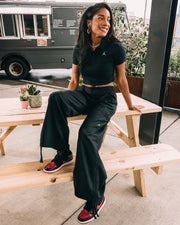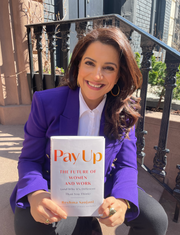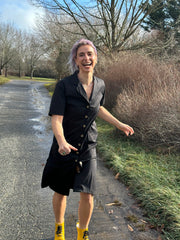

The idea of pivoting hasn’t always had a positive connotation, particularly for women. For a generation that has been hard wired to climb ladders, break glass ceilings and hyperfocus on a traditional definition of success at all costs, a falter away from those benchmarks translated as failure. Luckily, the meaning (and feeling) behind pivoting has now taken on a completely different life. One that is not only positive, but promising and empowering.
Emily Tisch Sussman is defining the art of the pivot. As a political strategist whose family grew by 3 kids in under 4 years, Sussman had to rethink the varying demands of her life and to make hard choices about the career path she always thought was inevitable. The result was her own personal pivot, one that has opened up an entirely new way of thinking and inspired her to explore how pivoting is not only beautiful, but connective.
She shares stories about the power of the pivot on her wildly successful podcast, She Pivots, where her guests have included everyone from Kamala Harris to Vanessa Hudgens, who talk about all forms of pivoting and rethinking and redefining success.
Get to know more about how Sussman has created a platform that celebrates all of the ways in which we pivot and her “work around” when being hit with a challenge or “no.”
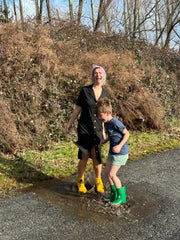
What was the impetus to start She Pivots?
It all started when I was working in DC as the Vice President of Campaigns for the Center for American Progress - I was at the top of my career.
I thought that politics was “it” for me. It was what I measured my success against and how I measured my value. I worked on key strategies to resist the Trump Administration’s harmful policies and helped establish a Gun Violence Prevention Network. The work felt fulfilling and I was at the top of my game…and then I had three kids in just four years right at the start of the Trump presidency. I remember being in the studio for an early morning TV hit at 4:30am, trying to pump and then having to go to work afterwards all while dealing with the 24 hour news cycle that was coming out of Washington and I just thought - I can’t sustain this anymore. I wasn’t able to show up for both my family and my job in the way that I wanted, so I stepped away.
Since then it has been a journey of learning to let go of my former idea of success. At times it wasn’t easy and it was the support and stories of other women who had done something similar that got me through. As I kept searching for stories of inspiration I realized that we needed to change the cultural conversation around our careers and it was through these stories that we could move the needle.
Going through my own pivot and building She Pivots, I no longer buy into the “traditional” markers of success anymore for myself (i.e. a promotion, corner office, etc.). The true essence of She Pivots is to prove to women that we can redefine success for ourselves. It might not look the way we originally envisioned, and there may be difficult times, but each of our experiences
and decisions build on one another to who we are now - and that is enough.
A “no” is simply a data point that you can use to adjust your strategy.
What has been the biggest challenge in creating She Pivots?
Putting so much of my vulnerability out there for the world. I was still in a fairly bad place emotionally when I started the show. I was mourning the loss of my political career and trying to figure out who I am and what my identity was without it. I really did start the show because I needed advice for myself. But admitting that to myself, and then letting the world in on that dark secret was very vulnerable and difficult. Fortunately, the concept resonated and the more I hear from listeners that the stories have helped them as well, the more comfortable I am with the decision to air it all out there.
What is one of the most valuable lessons you've learned from fellow Pivotors in your interviews?
There are so many to choose from - I first think of Paula Neira a trans Navy Veteran who had to leave behind her love and admiration for the Navy to be her authentic self. Or even Dr. Edith Eger, a holocaust survivor whose incredible and heartbreaking story of resilience was almost untold as she hid her past and her traumas for the majority of her life. And of course Omi Bell who created Black Girl Ventures (BGV) after struggling to make ends meet for her and her kids. Now BGV hosts pitch competitions all over the world providing access to capital for Black/Brown women founders.
What is one of the most valuable lessons you've learned from fellow Pivotors in your interviews?
There are so many to choose from - I first think of Paula Neira a trans Navy Veteran who had to leave behind her love and admiration for the Navy to be her authentic self. Or even Dr. Edith Eger, a holocaust survivor whose incredible and heartbreaking story of resilience was almost untold as she hid her past and her traumas for the majority of her life. And of course Omi Bell who created Black Girl Ventures (BGV) after struggling to make ends meet for her and her kids. Now BGV hosts pitch competitions all over the world providing access to capital for Black/Brown women founders.
Your merch says "My Kids Killed My Career" (LOVE) Tell us about that statement and if/how it resonated with other women who've read or wear the merch.
Well first and foremost I had to say that I love my kids - I say this phrase a lot, that my kids killed my career. While there is definitely truth in it, I did ultimately leave my career because of them but at the same time they opened my world up to so much more than I could have ever imagined.
And make no mistake, it wasn’t easy. And there are still days when I wonder “what if” but those difficult moments are what my show She Pivots was born out of. I feel so lucky to be able to sit down with other incredible women to learn how their lives and perspectives have changed through their pivots.
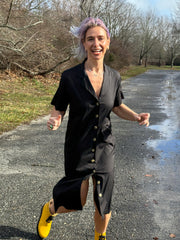
What do you think everyone can be doing to ensure the conversation around making women's work more visible and valued is amplified?
We just had our She Pivots Season 3 launch party and I made sure to encourage everyone to be bold and make asks of one another. Put out what you have to offer. We are the generation of women who build bridges instead of competing with one another.
For women, I think we find it hard to make a direct ask but we have to start. And trust that the person on the receiving end wants to help us. We can also model this ourselves by always asking how we can help someone, so that the door is open and they don't have to ask themselves.
Your 3 morning must haves?
Coffee, coffee, and coffee!
What is your "work around"? Your strategy or plan when getting hit with a "no" or roadblock?
A “no” is simply a data point that you can use to adjust your strategy. More often than not, a “no” comes from a lack of understanding or a lack of resources. My work around is always to make things easier for people. Offer to draft things, or to send over assets, or to map out the structure or logistics of what you’re aiming for.
My other secret work around is patience. A “no” usually means “not right now” and it’s important to remember that. This also means not to shy away back into the shadows. Be sure to keep those relationships up. This could look like everything from commenting or liking posts on social media, sending congratulations emails, or texting them about a shared interest.
I also want to point out that a “no” can lead you towards something unexpected and better than you could have imagined. Most, if not all, of our guests' pivots have come from a difficult moment - a place they couldn’t see a way out of. But ultimately it built on top of everything else to lead them where they are now. It’s important to keep that perspective when faced with challenges. Be open to opportunity and change, you never know where it can lead you.
